Make Food, Not War
Food as resistance in the time of conflict
For the past three weeks, I’ve been in Thailand, catching up with old friends, making new ones and gorging on delicious food. I’ve organised two exhibitions and worked ridiculous hours.
The experience has been invigorating and heartbreaking in almost equal measure, but the overwhelming sense I am coming away with from the Burmese exiles I’ve met is the determination to carry on fighting even in the face of overwhelming challenges.
2024 has been a pretty hard year for those of us who want a fairer, nicer, greener, and more peaceful world. But for the year’s last issue, I want to leave you feeling inspired instead of angry and sad, which I’ve done plenty of times this year. So I’m highlighting a handful of people from Myanmar who have chosen to make a difference through food.
I’m skipping Thin’s Pickings to keep this issue life-affirming. Thin Ink will be back on Jan 10.
Htet Khine Soe was in eighth grade when he first got into trouble with the Burmese military authorities. He was a newbie at a high school in Yangon, Myanmar’s largest city and former capital, after following his father’s job posting from their small hometown in a region north of Yangon.
Things were going well at first. He’s an avid painter and based on a recommendation from his old school, he was able to paint often and was also asked to teach other students. His drawings filled his class’s “multimedia classroom”, a pet project of the former spymaster Khin Nyunt, who was both feared and loathed in equal measure.
Khin Nyunt also held the positions of Myanmar Education Committee Chairman and State Peace and Development Council Secretary-1 (hence the moniker S-1), and later as Prime Minister. So when he planned to visit Htet’s high school, it was a big deal.
“The problem started when his assistant came first and told me to put my hand together in prayer position to greet S-1,” Htet recounted.
The lu-gyis (Burmese word for ‘elders’) were already displeased with Htet: a day after they asked him to cut his long-ish hair for S-1’s visit, he turned up with a shaved head. Now he was refusing to greet Khin Nyunt with his hands clasped in front of his chest. They asked him if he was a Muslim.
Like a vast majority of people in Myanmar, he was raised by Buddhist parents. But this gesture, called “let oat chi” in Burmese, is reserved for pagodas, shrines, and monks, not for lay people, no matter how powerful. Htet felt that shouldn’t change.
“I told them it’s only for the Three Jewels of Buddhism (Buddha, dharma, and sangha). They got really angry and told the teachers that unless someone can guarantee I won’t say such things during S-1’s visit, I shouldn’t come to school that day.”
So he agreed to stay away, but was unable to convince his teachers to let him bring his artwork home. “The next day when I came to the classroom, I saw that my paintings had been credited to others. I was so upset and angry,” he recalled.
From then on, he was considered a troublemaker, a term too often bestowed on curious and questioning students who refuse to abide by Myanmar’s conservative and strictly hierarchical society.
That spark of independence followed him through high school and to the university, where he got involved in student union activities - a dangerous move in a military dictatorship with a long history of brutally suppressing student protests - and the 2007’s Saffron Revolution.
Around 2012-2013, Htet became a core member of the Myanmar chapter of Food Not Bombs, a global social movement dedicated to non-violence and serving free vegetarian or vegan meals.
Like its parent organisation, the Myanmar team has anarchist leanings and was founded by Kyaw Kyaw, leader of Rebel Riot, the country’s best-known punk rock band. Check out this piece about them in Kerrang!.
Almost every week, Kyaw Kyaw, Htet, and a handful of others went around distributing food to homeless people in downtown Yangon.
“We’d buy the food from street vendors and give it to people in and around Sule Pagoda (a downtown Yangon landmark). Afterwards when we got bigger, we expanded to different neighbourhoods. Sometimes sex workers joined us to help,” he recalled.
“We’re not a charity. We’re about solidarity. For us, we have no gods, no master, and we don’t accept people profiting from community work.”
Htet reckons there were thousands of homeless people across Yangon then. The numbers have undoubtedly ballooned since, victims of an economic collapse precipitated by the military coup.
I was curious to hear Htet’s reflections on the needs he witnessed and the image we, the Burmese, have of ourselves as a generous nation, although we don’t like to admit that this generosity is mostly for monasteries and pagodas.
“In Myanmar, even when people make donations, there is still some stinginess involved. People say, “Oh they’re eating too much or they’re taking too much”. People want to be thanked. We oppose those things. We always say we don’t need thanks. Everyone has the right to food,” he said.
“The way we dress, we look like gangsters. Society treats us like garbage and sees us as garbage. But (the homeless people) can see who’s helping them,” Htet added.
He has brought the same ethos, passion and spirit to Food Not Bombs Maesot in the Thai border town now teeming with Burmese refugees who fled war, persecution, financial crisis, and forced conscription. Many are struggling to find jobs, lack proper documentation which puts them at risk of being deported if discovered, and often have to navigate casual racism and corrupt law enforcement officials.
So the regular food Htet and his friends provide is a lifeline for these communities. Sometimes they would travel to more remote villages and illegal settlements to cook meals for the residents there.
“We don’t have a set schedule or calendar or budget. If we have the funds and/or if we see a need, we do it. I guess we’re disorganised because we’re anarchists,” he said, laughing out loud.
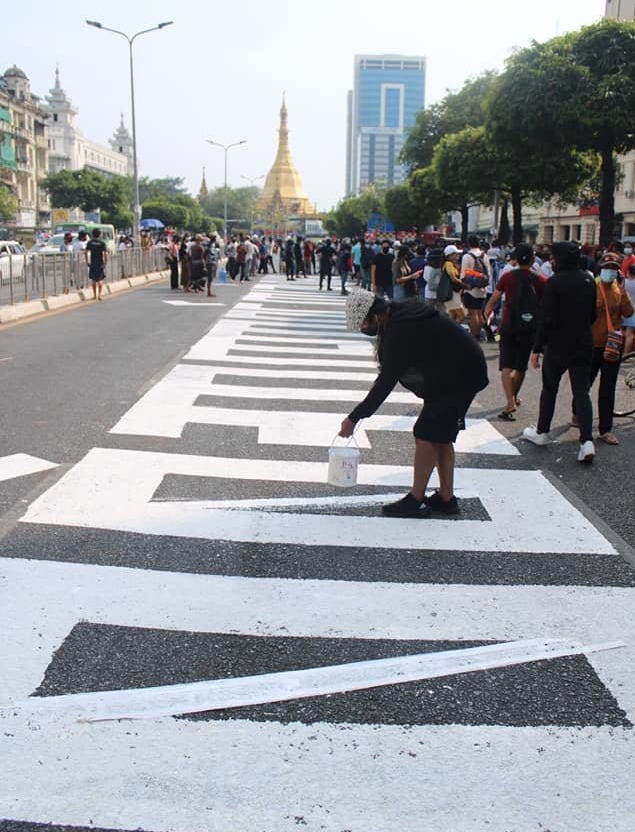
Sometimes, the group’s name causes confusion and misunderstanding, because some sees it as opposing the armed resistance against the Myanmar’s military junta.
“If we have a chance, we explain the ideology and thinking behind the origin of this name. We tell them, “Nobody wants to experience the horrors of war. That’s why we focus on food, and not bombs. But we are also part of the resistance movement.””
When I met Htet one cool evening in Mae Sot a couple of weeks ago, he told me it had been nearly two years since he arrived in the border town.
He’d had a few close shaves with the law since his eighth grade days: he got into trouble after taking part in protests against a deeply unpopular education law and narrowly escaped being arrested at his own wedding in 2015 by disguising himself as a member of Rebel Riot.
But the end of 2021 was particulary perilous. Htet had been organising and participating in flash demonstrations against the military. One day, the army shot at the car he and a friend usually used, but it was his friend’s father who was inside.
“He was killed,” Htet said quietly. “That’s when I fled.”
Mae Sot is now home and he’s supporting the growing Burmese community through Food Not Bombs as well as other initiatives. When we sat down for a chat that evening, he had just finished a practice session for the Maesot Eain female football team (Eain means Home in Burmese).
“Maesot Eain is mostly about helping the men, women, and children who end up here. It is especially about improving children’s mental health, because they can’t play out in the open. They can’t even speak very loudly at home. They were told to be quiet because the parents are afraid of their status. At least here, they can play freely twice a week.”
But of course, he is not planning to stop at just football training. He hopes it will become an educational space on social issues, to discuss subjects like racism and sexism that would normally be taboo in the traditional Myanmar society.
“Sometimes we would spend five minutes just talking about discrimination, why it’s bad and why we shouldn’t do it. We’re revolutionaries but we need to evolve first, because we’re revolting against those who don’t behave like humans.”
Five hours north of Mae Sot lies Chiangmai, Thailand’s second largest city. Here, another community organiser transplanted from Myanmar is determined to bring positive social change by providing good, healthy food to consumers both inside and outside the country.
James Aung is manager of Roots, a social business working directly with farming communities in Magway in central Myanmar who are willing to grow and produce good quality, safe foods. It says it guarantees fair pricing and wants to empower women by providing them with additional income opportunities.
“We want to encourage farmers who want to go organic and use sustainable practices but couldn’t because there isn’t a market,” he said.
“Our team is still small but I feel we can replicate this model across Myanmar because there are unique products in each region.”
Magway is part of the Central Dry Zone and one of Myanmar’s two key agricultural areas. It is known for growing pulses and beans and this is reflected in Roots’ products: peanut butter, smokey roast tahini, and golden gomashio (lightly roasted sesame seeds with a dash of sea salt).
The business has been around since 2017 and was gaining a foothold in 2019 when it started selling the products at Citymart (for those not familiar with Myanmar, this is the equivalent of selling your produce at Carrefour or Kroger). But two successive disasters - COVID-19 and the coup - decimated its growing customer base.
It has regrouped and plans to add new product categories in 2025, James told me. Not that it has all been smooth sailing. They are grappling with rapidly rising transportation costs, insecurity, and unpredictable weather patterns. Infrastructure is also a big challenge.
“In the past three months, there were power cuts from 6am to 6pm so it’s really hard to operate the production facility. But it’s also dangerous for our female team members to work in the evenings because they could be taken away for forced labour.”
The trickiest part is navigating the politics: staying away from the military and its business interests without provoking them or attracting their attention. But James has little doubt about Roots’ continuing work in Myanmar.
“The people who are hurt the most by general sanctions are the ordinary people. When prices go up or a factory gets shut down, it’s the working class who are affected. The military and the businessmen have money.”
Last December, I wrote about Trish and her famous supper clubs in Chiangmai that were bringing the oft-neglected and misunderstood Burmese cuisine into the mainstream. I’m very happy to report she is bringing her skills to a wider audience.
She has opened “and then we drink”, a wine bar with Burmese-inspired tapas which is quickly gaining a following among both the local and expatriate community. It is tucked on the side of a great brunch space called The Goodcery.
Trish said practical reasons such as financial stability and the ability to stay longer in Chiangmai prompted her to open the space, but it helped that she’s partnering with people who share the same values.
“Another important reason is to be able to legally hire young displaced Burmese who are affected by the conscription law. Now we are seen as a movement where Thai-Myanmar friendship can be strengthened from an entrepreneurial point of view,” she said, adding she wants to create “a non-toxic, decolonised, and honest approach to food, culture, and the workplace”.
The menu - “cooking good food with an intention”, she said - is a nice mix of old and new, pairing sourdough focaccia with laphet (pickled tea leaves) butter, Shan tofu with a tomato sauce ubiquitous in many Myanmar homes, and crispy pork belly with Burmese mole, an accurate but more appetising description of black soy bean paste.
In the span of two weeks, I went there twice and loved them all.
My favourite? “Mohinga salad”, a play on Myanmar’s national dish. It’s normally a fragrant fish noodle soup laced with lemongrass, but this one is a dry version. I was hooked at the first mouthful because it brought me straight back to the kitchen at my (currently out of reach) home in Yangon.
Below are some gratuitous photos of her food.
If you’re familiar with food in Myanmar, you’ll know that Shan cuisine is a perennial favourite with both locals and foreigners alike.
The much-loved dishes include Shan noodles (sticky flat rice noodles with a delicious meat sauce eaten dry or as a soup), Myee Shay (thick rice noodles with a piquant sauce and shredded meat), Shan tofu which is made of chickpea flour (the best tofu in the world and yes, I am willing to die on this hill) and pickled mustard greens.
Inthar cuisine, which refers to dishes eaten by the inhabitants of the stunning Inle Lake in southern Shan, is similar yet distinct and no less flavourful.
There’s now a place in Chiangmai for those hankering for some Shan and Inthar food: Bamboo Nest @ Sanggadee, a beautiful eco-resort whose kitchen is manned by Myanmar chefs Min & May.
Final piece of good news! Thanks to a generous donor, Thin Ink now has some budget to commission food systems-related stories and musings in 2025.
They can be like this one I published a few issues ago, they can be more personal, or focus on solutions and inspiring people. There are no hard and fast rules, but I’d really like to support reporters from the developing world.
If you have any ideas (or) know anyone who does, please drop me a line. I’m offering 300 Euros for each commissioned piece of about 2,000 words.
As always, please feel free to share this post and send tips and thoughts on bluesky @thinink.bsky.social, mastodon @ThinInk@journa.host, my LinkedIn page, twitter @thinink, or via e-mail thin@thin-ink.net.


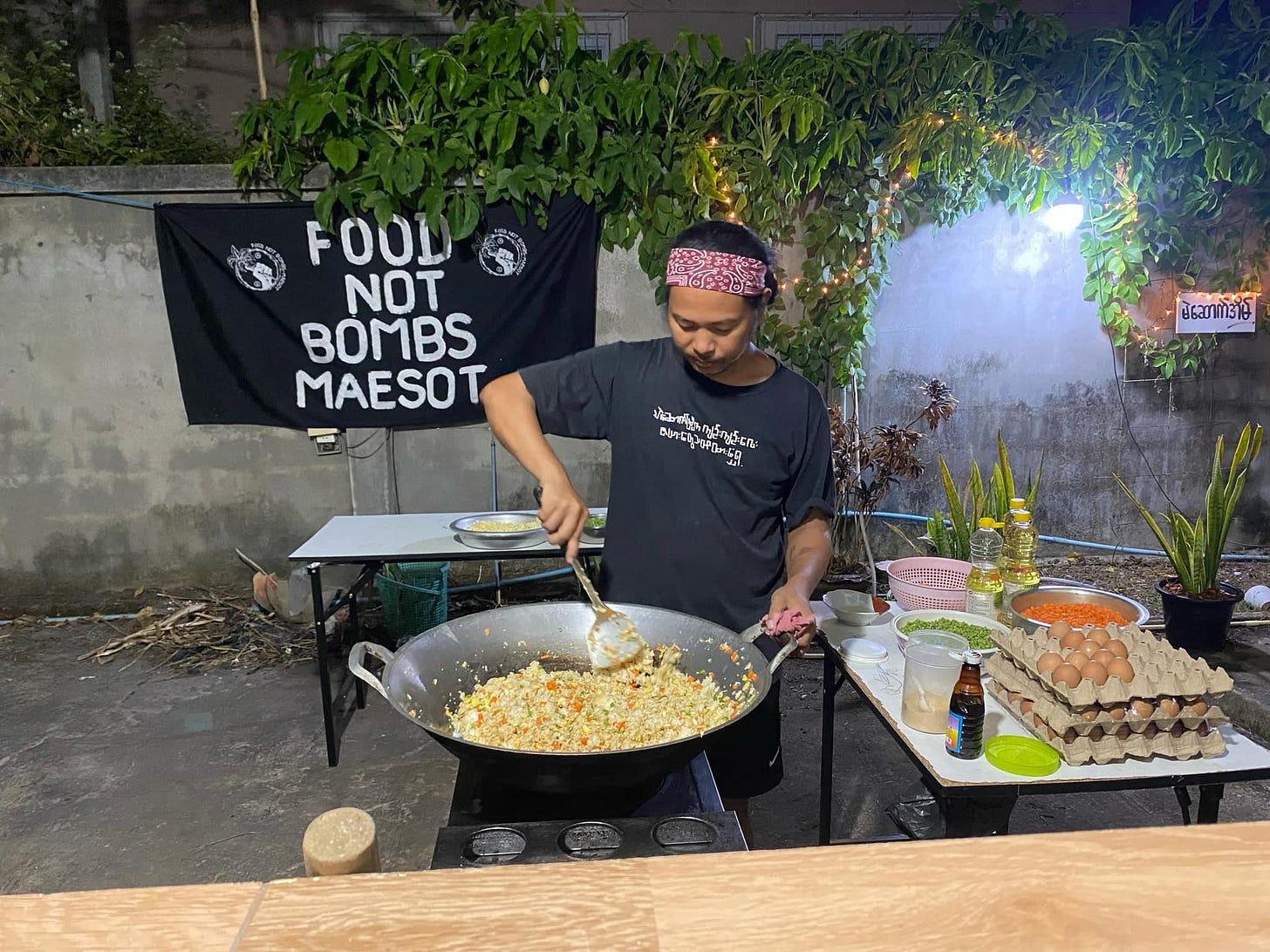
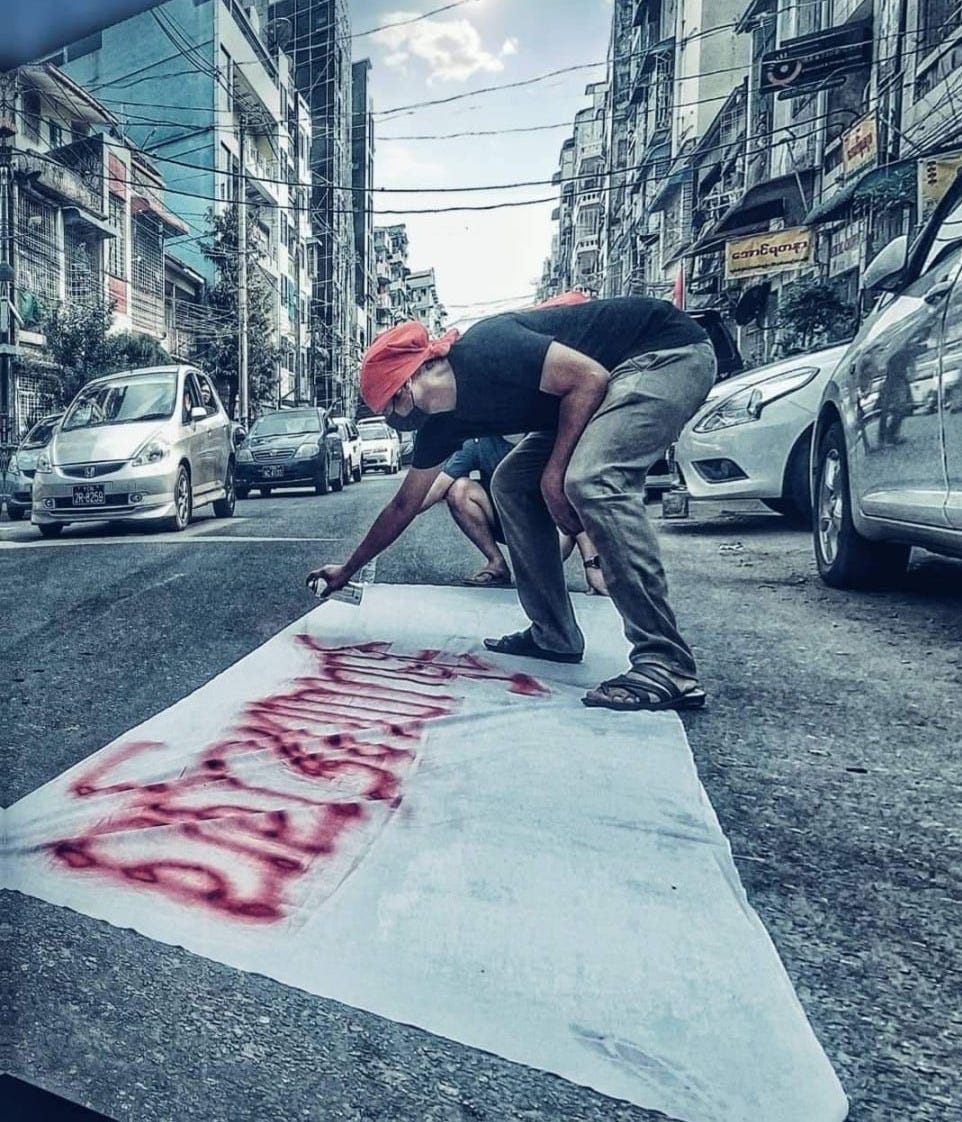
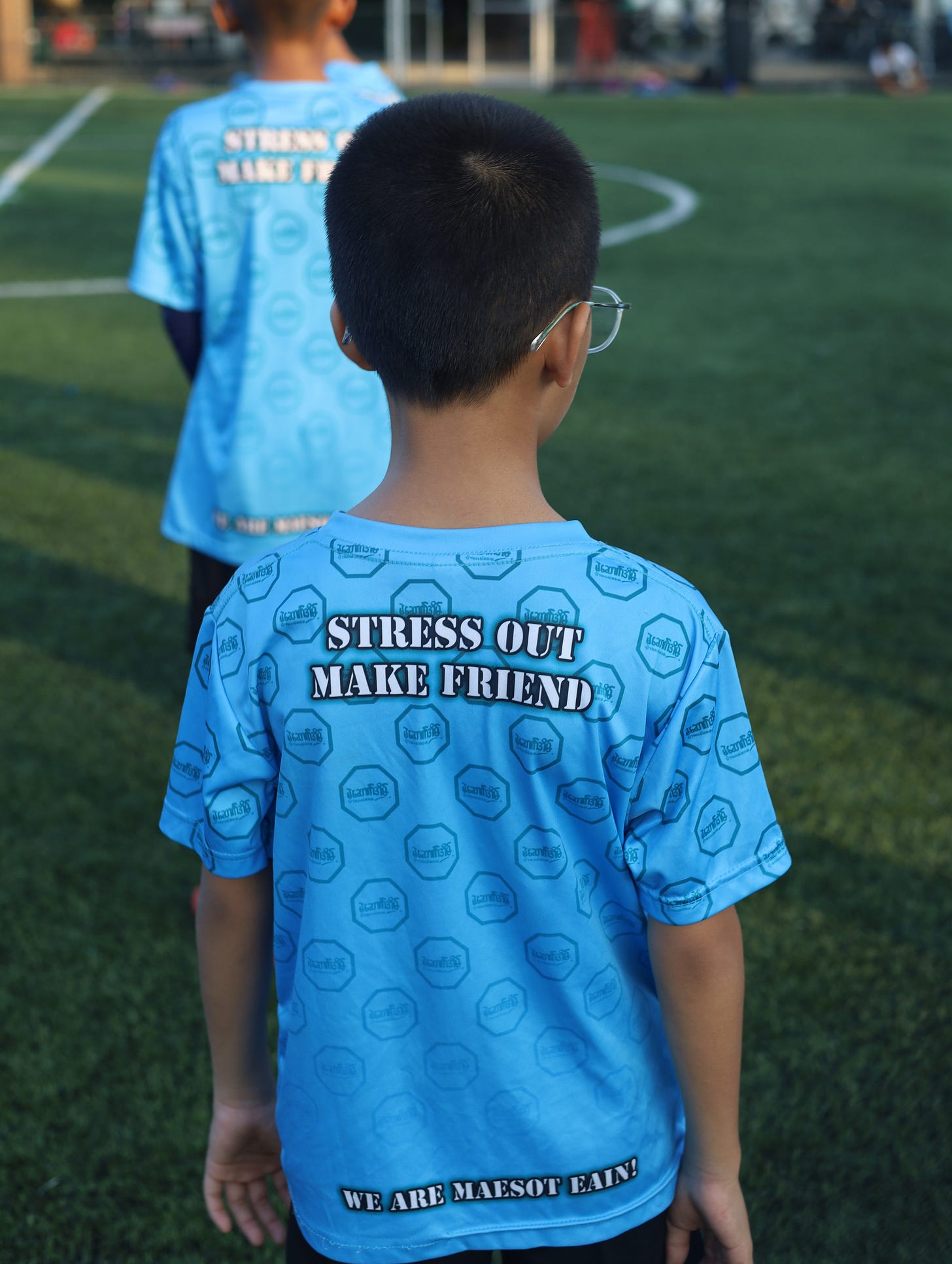




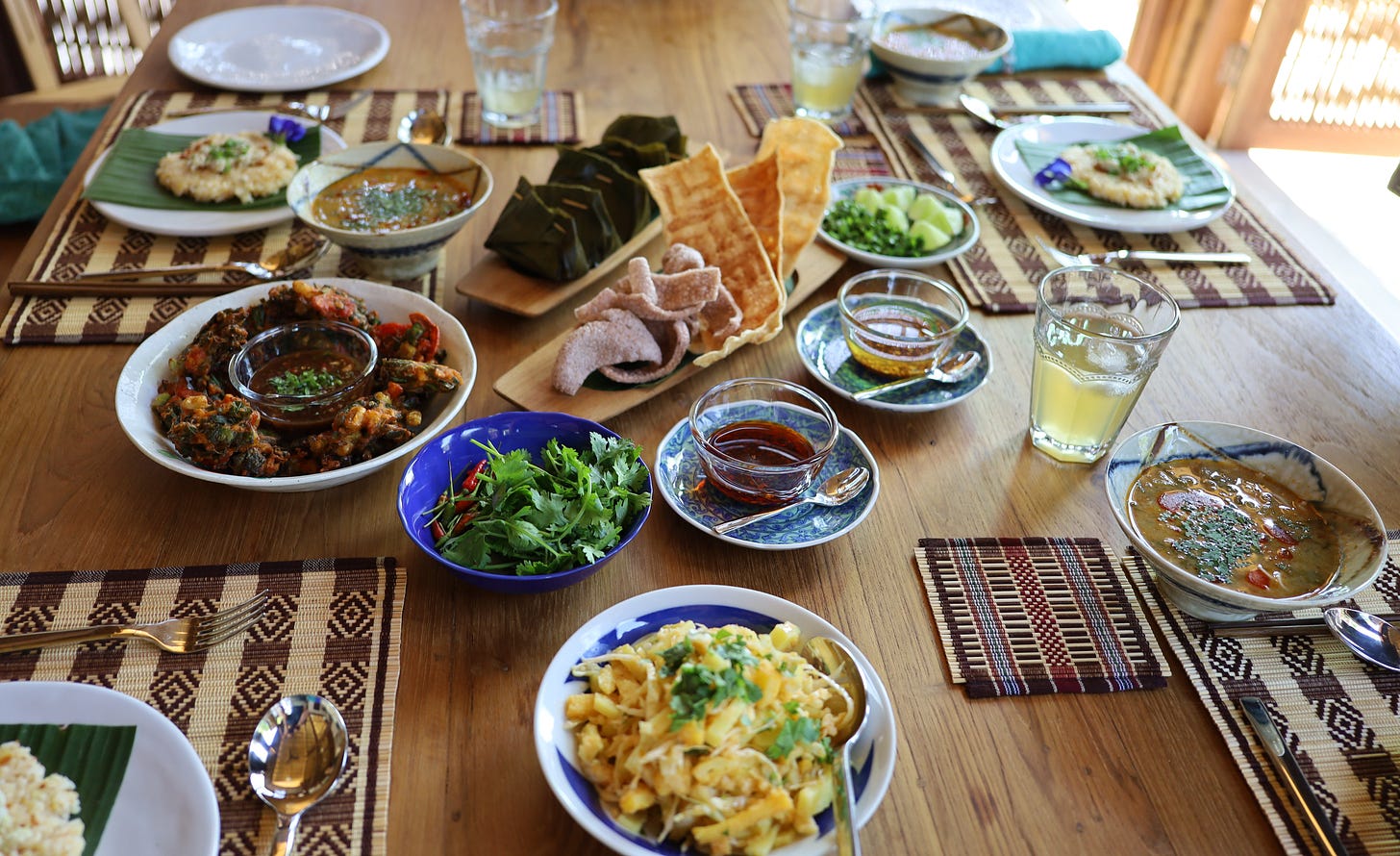

Love your writing, and I'm excited to try making shan tofu at home! Indian cooking as I'm sure you know uses a lot of besan (chickpea) flour :)